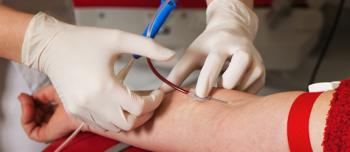The US government has three studies underway and a fourth in the planning stage, the results of which will yield hard evidence to help determine if a continued ban on blood donations for gay men is still warranted. Since 1977, blood donations from men who have had sex with another man (MSM) have been indefinitely deferred because of the greater prevalence of transmissible viruses such as HIV/AIDS and hepatitis B in these groups.
During a recent meeting of the Blood Products Advisory Committee of the U.S. Food and Drug Administration, James Berger, acting director Advisory Committee on Blood Safety and Availability at the US Department of Health and Human Services (HHS) framed the crux of the issue by asking: “Can blood safety be maintained or improved under a revised blood-donation screening criteria that would permit donations by lower-risk MSM [men who have sex with men] donors?” He added that HHS “is committed to continuous improvement in the safety of the nation’s blood supply.” Once research is concluded, explained Berger, “There will be a transparent and evidence-based evaluation of MSM donation policies.”
With the advent of enhanced blood screening and the potential stigmatization associated with the ban, gay rights advocacy groups have been supporting a change in the policy. The fourth study now being planned “really has the potential to be a game changer,” said Nathan Schaefer, director of public policy at the Gay Men’s Health Crisis (GMHC) in New York. He explained that such a study could establish criteria so that “a low-risk subset of gay and bisexual men” could be eligible donors.
There are great disparities in MSM blood-donor policies from country to country. While some nations allow MSM to donate if they have not had gay sex within a certain time frame, GMHC does not favor such an abstinence-based policy because it excludes gay men in committed relationships. A better policy, explained Schaefer, would be similar to those of Spain or Italy, in which all potential donors are asked how many sex partners they have had in the past six months. Anyone, gay or straight, who states that they have had only one partner can donate blood, while others are deferred for a given time period. That would ensure, said Schaefer, that “high-risk heterosexuals” are also deferred.
The National Hemophilia Foundation, the Hemophilia Federation of America and the Committee of Ten Thousand have argued that any change to current policy should be based on science. Further, they state that there is not enough evidence to suggest that a change would not increase risk and any change in policy must err on the side of caution. However, NHF CEO Val Bias has said he was “encouraged” by the efforts to get fresh research to evaluate changes to the current MSM policy. He added that NHF will “continue to work with all interested parties” to make sure that revisions “put safety first and are made on the basis of scientific evidence.”
It is estimated that it will take at least two years before enough evidence is collected to support a change in blood donation policy.
Source: The Washington Times, May 16, 2012





